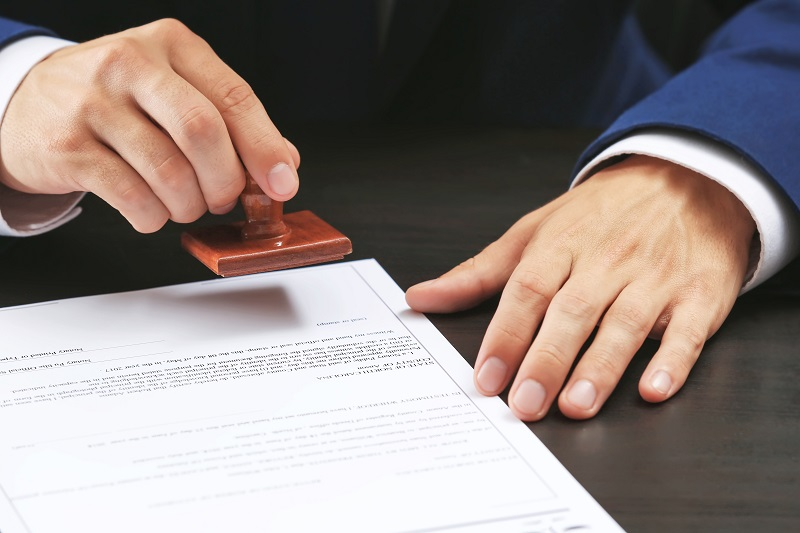Notaries in the Oklahoma attest to the veracity of the signatures, the freedom of the signatories or their identity. Public notaries cannot write documents or provide legal advice.
The maximum amount that a notary can charge is set by the state where he works. It generally charges between zero and $ 20 per signature, although in the case of mortgages and loans the cost can amount to $100. To obtain the title of notary public each state establishes its rules, which range from completing a form and paying a fee, to taking classes and passing an exam.
What does a notary public do in the United States?
Although the powers of public notaries vary by state, in general it can be said that their function in the United States is to attest, i.e. to certify the signatures’ authenticity or the identity of people.
Notary public may need to intervene in cases of deeds, loans, affidavits, inheritance, licenses, opening bank accounts, refinancing, real estate sales, power of attorney, contracts, mortgage closures, etc.
Among the most frequent work of public notaries, the following stand out:
Acknowledgement
In this case, a person appears and identifies before a notary and verbally declares that he signs or has signed a document freely and without pressure. Then the notary issues the Certificate of Recognition, whose main function is to attest to the veracity of the signature and which has been given free consent.
Attestation
A notary can attest that a document is a copy of its original.
Notarial Certification
In this certification, a person appears before the notary and signs a document in his presence. Next, the notary asks the signer if the content of the signed is true. The signer must answer verbally in the affirmative. If he lies, he would be committing perjury. Finally, the notary lifts the notarial certification, but does not read the document. In other words, attests to the signer’s reply, not the content of the document.
On the other hand, Notaries cannot legally advise, including immigration cases, nor are they authorized to prepare and write legal documents.
Each state regulates the requirements to allow a person to act as a notary within their territory. However, in some cases they are allowed to work in neighboring states or counties. In some cases, the notary is also allowed to practice anywhere in the United States. and even from abroad, which opens this profession to notaries who practice online.
In addition, states may prohibit persons with criminal records or immoral acts from exercising as public notaries. In some states, it is mandatory to deposit a bond before beginning to act as a notary public. Each state establishes the number of years of validity of the license, generally for five years, which can be renewed successively. Also, certain professions may include the possibility of acting as a notary public, such as court stenographers, some lawyers and bank employees.
Finally, to perform their work, states may require that notaries comply with certain formalities, such as keeping a customer record incorporating their signature or fingerprints. They may also require the use of a stamp.
Notaries in the Oklahoma attest to the veracity of the signatures, the freedom of the signatories or their identity. Public notaries cannot write documents or provide legal advice.
The maximum amount that a notary can charge is set by the state where he works. It generally charges between zero and $ 20 per signature, although in the case of mortgages and loans the cost can amount to $100. To obtain the title of notary public each state establishes its rules, which range from completing a form and paying a fee, to taking classes and passing an exam.
What does a notary public do in the United States?
Although the powers of public notaries vary by state, in general it can be said that their function in the United States is to attest, i.e. to certify the signatures’ authenticity or the identity of people.
Notary public may need to intervene in cases of deeds, loans, affidavits, inheritance, licenses, opening bank accounts, refinancing, real estate sales, power of attorney, contracts, mortgage closures, etc.
Among the most frequent work of public notaries, the following stand out:
Acknowledgement
In this case, a person appears and identifies before a notary and verbally declares that he signs or has signed a document freely and without pressure. Then the notary issues the Certificate of Recognition, whose main function is to attest to the veracity of the signature and which has been given free consent.
Attestation
A notary can attest that a document is a copy of its original.
Notarial Certification
In this certification, a person appears before the notary and signs a document in his presence. Next, the notary asks the signer if the content of the signed is true. The signer must answer verbally in the affirmative. If he lies, he would be committing perjury. Finally, the notary lifts the notarial certification, but does not read the document. In other words, attests to the signer’s reply, not the content of the document.
On the other hand, Notaries cannot legally advise, including immigration cases, nor are they authorized to prepare and write legal documents.
Each state regulates the requirements to allow a person to act as a notary within their territory. However, in some cases they are allowed to work in neighboring states or counties. In some cases, the notary is also allowed to practice anywhere in the United States. and even from abroad, which opens this profession to notaries who practice online.
In addition, states may prohibit persons with criminal records or immoral acts from exercising as public notaries. In some states, it is mandatory to deposit a bond before beginning to act as a notary public. Each state establishes the number of years of validity of the license, generally for five years, which can be renewed successively. Also, certain professions may include the possibility of acting as a notary public, such as court stenographers, some lawyers and bank employees.
Finally, to perform their work, states may require that notaries comply with certain formalities, such as keeping a customer record incorporating their signature or fingerprints. They may also require the use of a stamp.



